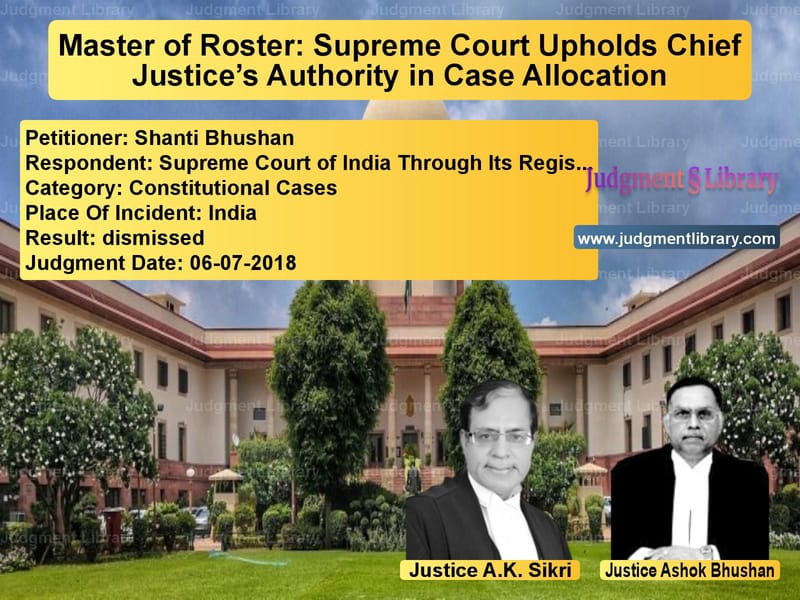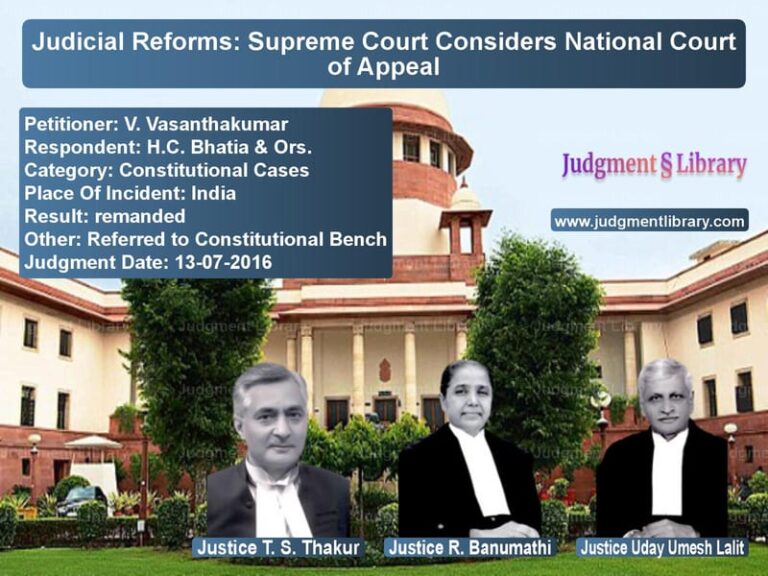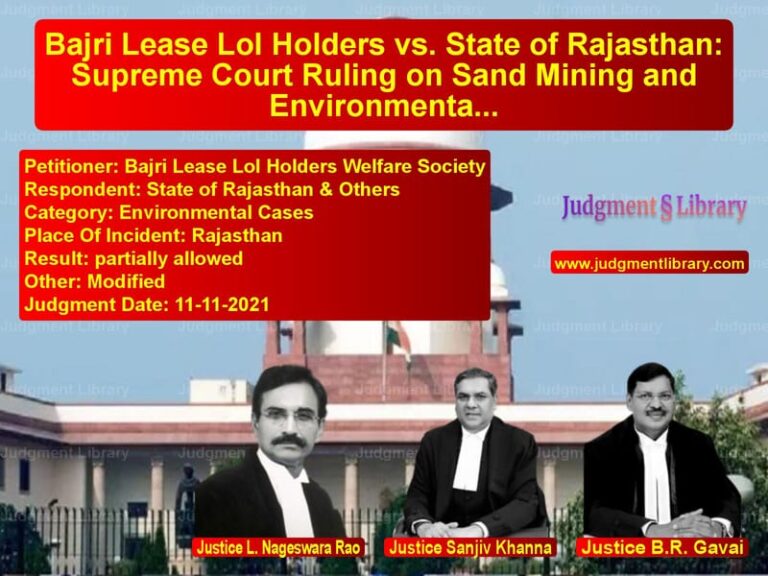Master of Roster: Supreme Court Upholds Chief Justice’s Authority in Case Allocation
The Supreme Court of India, in Shanti Bhushan vs. Supreme Court of India Through Its Registrar & Anr., reaffirmed the Chief Justice of India’s exclusive authority in constituting benches and allocating cases. The case, brought by senior advocate Shanti Bhushan, sought a redefinition of the Chief Justice’s role in roster preparation, arguing that it should involve a collegium of five senior-most judges instead of being an exclusive prerogative of the Chief Justice.
The Court, while acknowledging the importance of transparency, ruled that the power to allocate cases and form benches must remain with the Chief Justice to ensure smooth judicial functioning. The verdict upheld established precedents and emphasized the necessity of maintaining judicial discipline.
Background of the Case
Shanti Bhushan, a senior advocate and former Law Minister, filed a writ petition under Article 32 of the Constitution of India, challenging the authority of the Chief Justice as the ‘Master of Roster’. He argued that case allocation should be done by a collegium of the five senior-most judges, rather than being an exclusive function of the Chief Justice. The petitioner’s concerns stemmed from alleged lack of transparency in the listing of politically sensitive and high-profile cases.
Key Issues Raised
- Whether the Chief Justice of India’s role as ‘Master of Roster’ should be exercised collectively by a collegium instead of solely by the Chief Justice.
- Whether the allocation of cases and constitution of benches should adhere strictly to the Supreme Court Rules, 2013.
- Whether a more structured and transparent process is required to ensure fairness in the allocation of important cases.
Petitioner’s Arguments
The petitioner, represented by senior advocate Dushyant Dave, contended:
- While the Chief Justice is first among equals, the power to allocate cases should not be exercised arbitrarily.
- There should be a transparent and structured system to ensure fair allocation of politically sensitive and significant cases.
- The ‘Master of Roster’ principle should be reinterpreted to mean a collegium of five senior-most judges, similar to the collegium system used for judicial appointments.
- The Supreme Court should follow international best practices in case allocation.
Respondent’s Arguments
The Supreme Court of India, represented by Attorney General K.K. Venugopal, opposed the petition and argued:
- The Constitution and existing legal precedents make it clear that the Chief Justice alone is responsible for case allocation.
- Any attempt to involve a collegium in day-to-day case listing would create inefficiencies and disrupt the functioning of the judiciary.
- The current system ensures clarity and smooth operation of the Court.
- The Chief Justice’s authority in forming benches is necessary to maintain discipline and institutional integrity.
Supreme Court’s Observations
The Supreme Court, in its ruling, reaffirmed the Chief Justice’s exclusive role in case allocation. The Court emphasized:
“The Chief Justice is the Master of Roster and has the prerogative to constitute benches and allocate cases. This is necessary for the efficient transaction of judicial business.”
The judgment relied on several past rulings, including:
- State of Rajasthan vs. Prakash Chand (1998) – Held that the Chief Justice is the sole authority in case allocation in High Courts.
- Campaign for Judicial Accountability and Reforms (2018) – Reaffirmed that the Chief Justice has the final say in listing and bench formation.
- Asok Pande vs. Supreme Court of India (2018) – Rejected the argument that senior-most judges should automatically be included in benches.
Final Judgment and Conclusion
The Supreme Court dismissed the petition, holding that:
- The Chief Justice’s power as the Master of Roster is essential for maintaining discipline and order within the judiciary.
- Any changes to the roster system must come through amendments to the Supreme Court Rules, not judicial intervention.
- The existing system ensures institutional stability and should not be disturbed without compelling reasons.
The judgment reinforced the independence of the judiciary while ensuring that case allocation remains free from external influences. It also underscored the importance of transparency but maintained that the Chief Justice’s authority in these matters must remain absolute.
This ruling is a landmark reaffirmation of judicial discipline and hierarchy, ensuring that the Indian judiciary continues to function efficiently under the leadership of the Chief Justice.
Petitioner Name: Shanti Bhushan.Respondent Name: Supreme Court of India Through Its Registrar & Anr..Judgment By: Justice A.K. Sikri, Justice Ashok Bhushan.Place Of Incident: India.Judgment Date: 06-07-2018.
Don’t miss out on the full details! Download the complete judgment in PDF format below and gain valuable insights instantly!
Download Judgment: Shanti Bhushan vs Supreme Court of Ind Supreme Court of India Judgment Dated 06-07-2018.pdf
Direct Downlaod Judgment: Direct downlaod this Judgment
See all petitions in Constitution Interpretation
See all petitions in Separation of Powers
See all petitions in Public Interest Litigation
See all petitions in Judgment by A.K. Sikri
See all petitions in Judgment by Ashok Bhushan
See all petitions in dismissed
See all petitions in supreme court of India judgments July 2018
See all petitions in 2018 judgments
See all posts in Constitutional Cases Category
See all allowed petitions in Constitutional Cases Category
See all Dismissed petitions in Constitutional Cases Category
See all partially allowed petitions in Constitutional Cases Category







